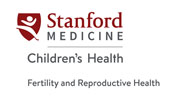Notice of West building lobby closure at Lucile Packard Children’s Hospital Stanford
Genetic Counseling for Family Building
What is a genetic counselor?
Our genetic counselors are highly trained professionals with master’s degrees who specialize in fertility and reproductive health. In other words, they intimately know the genes that play a role in fertility and reproduction. They bring their knowledge of basic science, medical genetics, and counseling to every visit with fertility patients like you to assess your genetic risk and help you understand your diagnoses.
How can my genetic counselor help me?
Your genetic counselor can help you:
- Understand and adapt to the genetic disease that affects you and your family.
- Interpret your family history so that you know how likely your genetic disease will occur or reoccur in your children.
- Break down medical terms for you, spelling out exactly what your test results mean.
- Empower you with genetic resources and the latest research on your condition so that you can make the best decision for you and your family.
How can my genetic counselor help during fertility treatments?
If you are undergoing fertility treatments or actively trying to conceive, your genetic counselor can:
- Screen you and your partner for genetic disease before you conceive.
- Test and screen your potential egg and sperm donors.
- Talk with you about Preimplantation Genetic Diagnosis (PGD) and Preimplantation Genetic Screening (PGS).
- Help you understand your options if you’ve had multiple miscarriages.
- Determine the genetic consequences of a union between relatives.
- Explain our many fertility treatments and services to help you conceive.
What is carrier screening?
When you want to start a family, you might consider having a universal carrier screening test—especially if you and your partner have the same disease. Carrier screening looks at several common genetic conditions and reveals any changes in DNA that might increase your chances of having a child with a genetic condition.
Most people are carriers for a handful of genetic conditions, even if there is no family history. That doesn’t mean you can expect your future child to have any significant health risks. However, odds increase when both you and your partner are carriers for the same condition. That gives you a 1 in 4, or 25% chance of having a child with that condition. Carrier screening is a simple blood or saliva test.
What is Preimplantation Genetic Diagnosis (PGD)?
If you or your partner carry a mutation that puts you at risk for having a child with a hereditary disorder, preimplantation testing of embryos can diagnose an embryo as affected or unaffected. Embryos which do not carry the affected gene can be selected for transfer. This process is called PGD. It can significantly reduce your chances of having an affected child by a hereditary disorder. It is typically done on individuals who have no difficulty conceiving. Many couples know that they are at risk due to a family member with the disease, but some individuals may be silent carriers (they don’t have signs of the disease but can still pass the problematic gene on to their child). Preconception carrier screening can help identify if you are at risk for having a baby with a common genetic syndrome.
What is Preimplantation Genetic Screening (PGS or CCS)?
Preimplantation genetic screening is different from PGD because it is done on individuals who do not carry a known disease-causing mutation, but wish to reduce their chances of chromosomal imbalance which could lead to miscarriage or a baby with an extra or missing chromosome, such as Down’s syndrome. As women age, their eggs are at higher risk of carrying a missing or extra chromosome. Preimplantation genetic screening of embryos can include all 24 chromosomes and is, therefore, sometimes referred to as comprehensive chromosome screening (CCS). PGS can be performed in conjunction with a standard IVF cycle in any couple, but is typically considered for individuals where the female partner is over 35 years of age. An additional benefit of PGS is that it improves our ability to choose the healthier/healthiest embryos, achieving a high success rate with a single embryo transfer and reducing your chances of twin pregnancies.
What are my options if I can’t use my own egg or sperm?
We offer third-party reproduction options, which simply means someone else provides the egg or sperm. This can happen with in vitro fertilization (IVF), when eggs and sperm are joined in a dish to form a human embryo. Our genetic counselors work with you and your selected donor, whether the donor is someone you know or someone who is anonymous. Our IVF Lab is one of the best in the region because our reproductive experts use state-of-the-art facilities to carry out evidence-based methods that create consistent, high quality outcomes.

Connect with us:
Download our App: